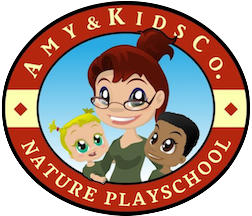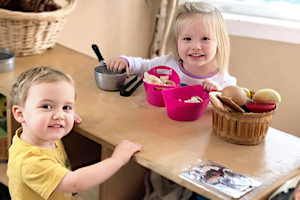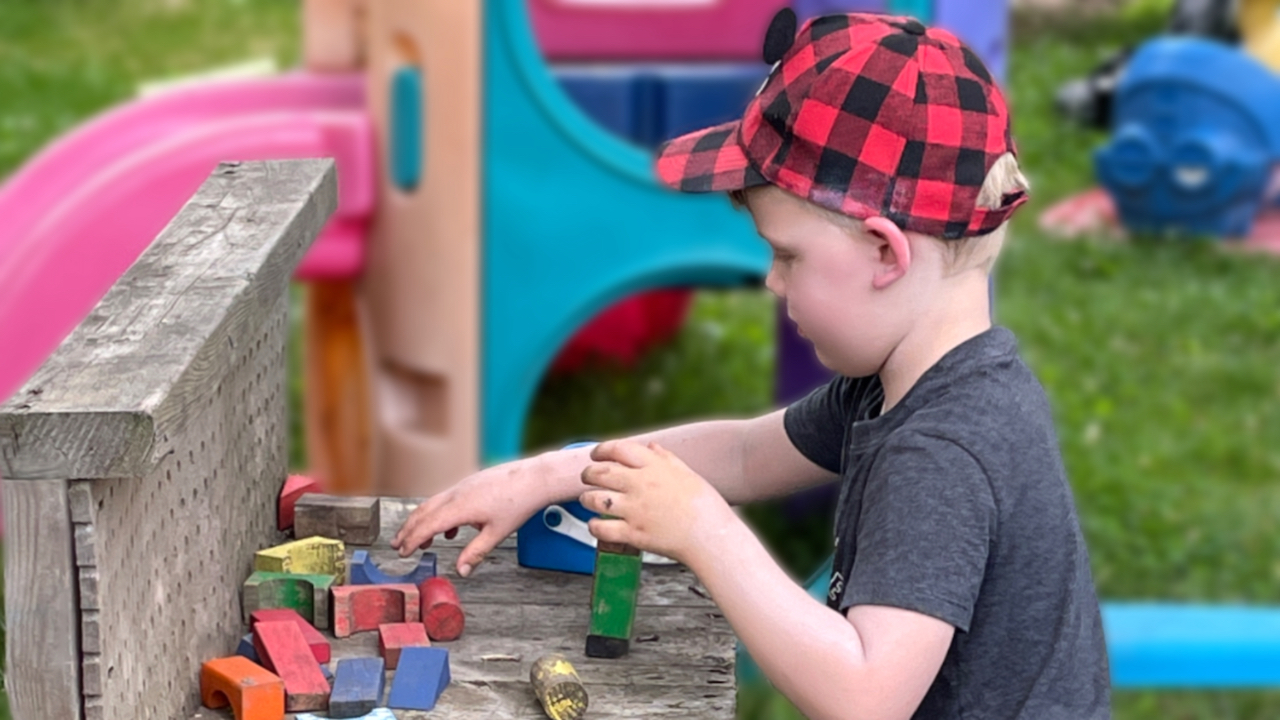
Play-Based Learning
Studies have shown that play-based learning is the most appropriate and effective method of learning for children. Through play, children develop essential life skills and lay the foundation for success in school, and adulthood.
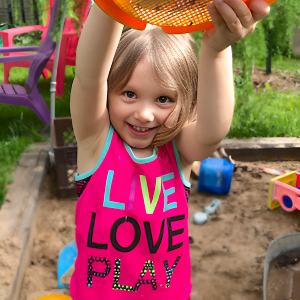
What is Play-Based Learning?
According to the Early Years Learning Framework of Australia, play-based learning is "a context for learning through which children organise (sic) and make sense of their social worlds, as they engage actively with people, objects and representations."
Play-based learning builds new knowledge on prior experience and encourages children to build social skills and relationships. While playing, children learn to solve problems, try out new ideas and experiences, and explore the world around them.
Play-Based Learning is Powerful
Play is extremely important to children's learning because it prepares children for formal "school" learning. Play provides the foundation children need to learn abstract ideas, like letters (symbols for sounds) and numbers (symbols for number concepts). Children who are allowed plenty of time for play will pretend, imitate, experiment, explore, problem-solve, cooperate, and learn how to form relationships.
Play-Based Learning Environments
Environments that promote learning through play don't look like the classrooms many of us grew up in. Instead of children sitting quietly and working, play-based learning is chaotic, messy, and loud. Teachers don't direct play, but plan for learning by creating and engaging environment and providing large amounts of uninterrupted play time. Children choose activities based on their interests and freely move about as their interests change. Learning occurs spontaneously as the children interact with each other and the environment.
Play-Based Learning Centers
Learning centers are where the real "work" happens. Playing in learning centers helps children develop independence, practice decision-making, and develop longer attention spans. In addition, carefully planned learning centers reinforce skills and concepts and enable individual learning goals to be met. The teacher's role is to observe, facilitate, and help extend the play as needed.
Here are some things children learn in each learning center, and ways to help extend the learning at home.
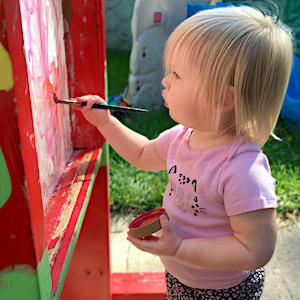
Art Experiences
- Learn to make choices
- Observe cause and effect
- Express feelings and imagination
- Enjoy the creative process
- Use symbols and pictures to represent ideas
- Practice with art materials like paint, scissors, and glue
At home: Provide simple art materials like paper, crayons, markers, magazines to cut, and glue. Understand that your child will be much more interested in the creative process than the finished product. Be sure to say "Tell me about..." instead of "What is it?"
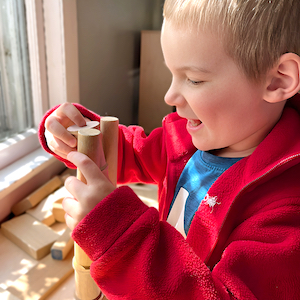
Learning with Blocks
- Learn to share and play with others
- Explore math concepts of size, shape, height and depth
- Discover science concepts of weight, balance, gravity and stability
- Use imagination to make something from the mind's eye
- Construction problem solving
- Develop small and large muscle control
At home: Blocks don't need to be expensive to foster learning. At home you can provide Duplos, alphabet blocks, or homemade blocks of milk cartons and newspaper to provide as rich a learning experience as pricey hardwood blocks.
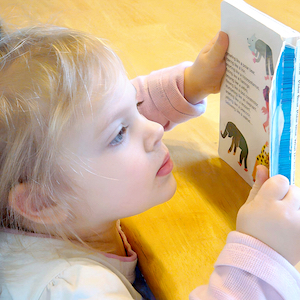
Children's Books
- Lay the foundation for future learning success
- Get to know sounds, words and language
- Understand symbols as they relate to real-life objects
- Learn the difference between real and "make believe"
- Predict and apply previous knowledge
- Spark imagination and creativity
At home: Encourage children to become readers by surrounding them with books and reading together every day. Being a good reader is one of the most important skills children need to become successful learners.
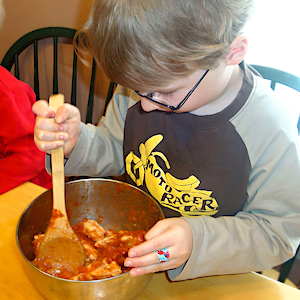
Learning with Cooking
- Learn about nutrition
- Develop eye-hand coordination
- Practice following directions
- Use all five senses: sight, smell, hearing, touch, and taste
- Strengthen problem-solving skills
- Discover science concepts like the properties of matter
At home: Encourage children's interest in cooking by allowing them to help in the kitchen. Young children can tear lettuce for a salad, add ingredients and stir with a spoon, put toppings on pizza, spread toppings on toast, etc.
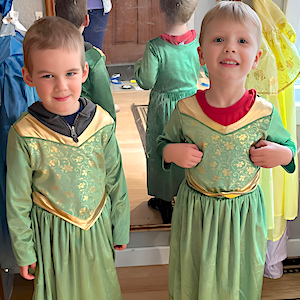
Dramatic Play
- Explore different roles (mom, dad, baby, pet, etc)
- Actively use their imagination and creativity
- Practice cooperation and problem-solving
- Develop self-regulation skills
- Express themselves in different ways
- Provides an emotional outlet
At home: Provide a "prop box" with scarves, hats, and other clothing items for costumes. Large shipping boxes provide endless creative possibilities. Pillows and old sheets or blankets make great tents and forts.
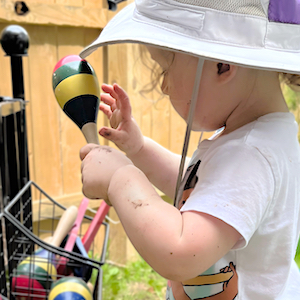
Music and Movement
- Develop greater muscle control
- Enhance self-concept and self-esteem
- Express themselves creatively
- Learn new words and concepts
- Learn to appreciate different types of music
- Improve balance and coordination
At home: Listen to live and recorded music from different cultures, time periods, and in different styles; encourage your child to move with the music. Simple shakers can be made by placing rice or beans in plastic eggs and taping the seam closed.
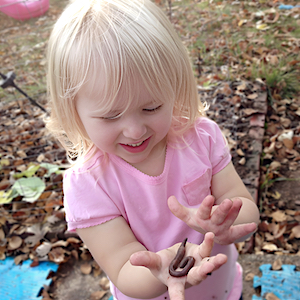
Playing Outdoors
- Develops physical fitness, stamina and agility
- Expands knowledge of the natural world
- Allows safe risk-taking
- Increases focus and attention
- Presents mathematical and scientific concepts
- Lowers stress levels and strengthen the immune system
At home: Provide plenty of time for unstructured play outdoors and keep a few essentials handy, like bubbles, sidewalk chalk, and balls. Visit local parks and playgrounds for a change of pace.
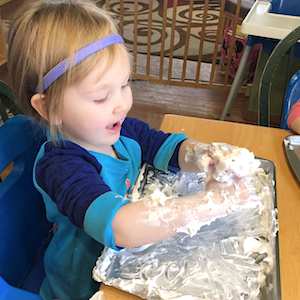
Sensory Activities
- Soothe through the sense of touch
- Develop size, measurement, and other early math skills
- Increase concentration and attention on a task
- Reinforce color and shape recognition
- Teach science concepts like cause and effect
- Develop small muscle skills
At home: Provide play dough, a container of beans or rice, and plenty of bubbles in the tub. Don't forget the other senses - what can you see and hear in your home? Allow your child to smell and taste ingredients when you're cooking. Sensory opportunities are all around!
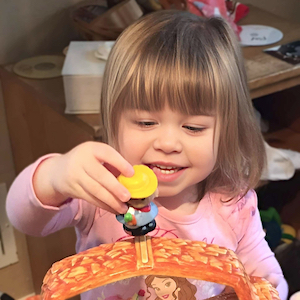
Toys, Games, Puzzles, etc
- Improve eye-hand coordination
- Practice cooparating, sharing, and taking turns
- Use senses to explore
- Develop classifying, sorting, predicting, and problem-solving skills
- Learn about shapes, sizes, weights, and textures
- Develop patience and persistence
At home: Provide a wide variety of puzzles, games, and toys appropriate for your child's age and interests. Take some time with your child to play games and sort their pieces (math!), do puzzles, and talking together to enhance social and language skills.
Curriculum
Our play-based curriculum supports developmentally appropriate learning for all children while highlighting the unique benefits of a home-style environment.

